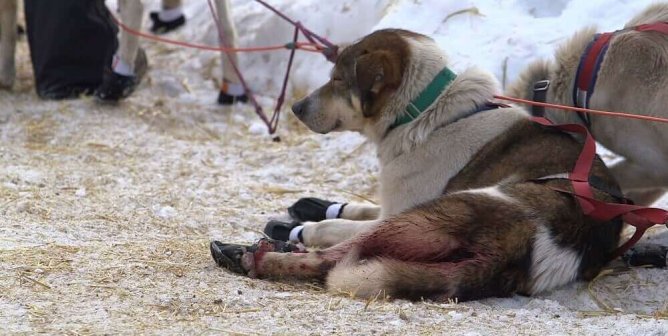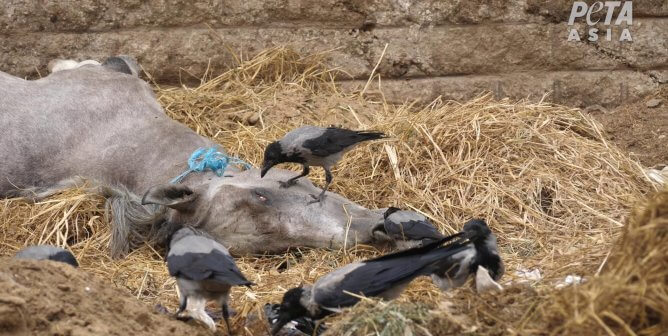Greyhound Racing: Death in the Fast Lane
Greyhounds’ natural speed and grace have been exploited for human benefit since the days of the ancient Egyptians. The dogs have been used for centuries in hunting and coursing events, but the advent of modern dog racing at the turn of the 20th century prompted greyhound breeders and racetrack proprietors to begin to think of this breed as a mere commodity. The cruelty of the industry is finally being exposed, and thanks to the resulting public outcry, the number of spectators attending greyhound races has declined. Greyhound racing continues to generate millions of dollars in gambling revenue in the states that still allow it.
The Killing Field
In a horrific example of the industry’s cruelty, in 2002 the remains of approximately 3,000 greyhounds from Florida racetracks were discovered on the Alabama property of a former racetrack security guard who had been “retiring” unwanted greyhounds with a .22-caliber rifle for more than 40 years.1 The attorney for the accused said, “If there’s anybody to be indicted here, it’s the industry because this is what they’re doing to these animals. The misery begins the day they’re born. The misery ends when my client gets ahold of them and puts a bullet in the head.”2
In a similar case in the U.K., an undercover investigation by the Sunday Times revealed that a builder’s merchant had been taking healthy greyhounds who had been judged by their trainers to be too slow to race, killing them with a bolt gun, and burying them in a 1-acre plot behind his home. The paper estimated that the man had killed more than 10,000 dogs over a 15-year span.3
In 2020, an investigation by GREY2K USA exposed live lure training in Oklahoma, Kansas, and Texas, with “farms” training dogs by allowing them to tear apart rabbits.4 During the course of an investigation that spanned nearly a year, GREY2K USA documented illegal greyhound training at breeding farms in three states. The details of this investigation and relevant footage have been provided to law enforcement officials and regulators in Arkansas, Florida, Iowa, Kansas, Oklahoma, Texas, and West Virginia.5
These massacres illustrate that greyhounds are treated as though they are disposable running machines. They are produced in quantities that require the disposal of surplus dogs, and industry workers regularly kill greyhounds who become injured, grow old, or are deemed too slow or no longer profitable.
Winners and Losers
Thousands of greyhounds continue to be killed each year, even though the industry is in decline. Some puppies are killed in the name of “selective breeding” before they ever touch a racetrack. Dogs who do qualify to become racers typically live in cages and are kept muzzled by their trainers at all times. Many exhibit crate and muzzle sores and suffer from infestations of internal and external parasites. Although their thin coats and lack of body fat make them extremely sensitive to temperature, greyhounds are forced to race in extreme weather conditions—ranging from subzero temperatures to sweltering heat of more than 100 degrees.
At the VictoryLand dog track in Alabama, officials suspected that a malfunctioning heating system at a kennel caused 23 greyhounds to slowly die.6 At least 37 dogs kenneled at Ebro Greyhound Park in Florida died of starvation and dehydration at the hands of their trainer, who was charged with felony cruelty to animals. Dogs who were found alive in his care had duct tape wrapped tightly around their necks.7 In 2005, 73 greyhounds died in a West Virginia kennel that went up in flames because of a faulty ceiling fan. Only five years earlier, more than 50 dogs had died from heatstroke when an air conditioner malfunctioned in a kennel owned by the same man.8
In 2017, PETA obtained photographs and video footage of approximately 150 greyhounds—most if not all of whom were bred for racing—suffering in squalid conditions at a Texas kennel doing business as The Pet Blood Bank, Inc., which sells dogs’ blood to veterinary clinics across the U.S. through Patterson Veterinary Supply, Inc. Photos and video footage showed dogs pacing and spinning in circles, cowering, and even urinating on themselves in fear when approached. Dogs had open wounds, rotting teeth and severely overgrown toenails. According to The Washington Post, “Pet Blood Bank owner Shane Altizer did not deny that the images were taken there, but said they predated his 2015 purchase of the company or were “moment snapshots” unrepresentative of overall conditions now.” A veterinarian who visited the facility earlier in the year said she found the dogs to be in satisfactory condition but after seeing the pictures, believed that “(T)he facility was ‘cleaned up’ before our touring…This certainly suggests that regional, state and/or federal regulation is warranted.”9
Help and Hope
Greyhounds are usually gentle, quiet, and friendly, and some lucky dogs are placed in caring homes. Reputable adoption groups, funded by donations and staffed by volunteers, save as many retired greyhounds as they can. There are greyhound rescue groups in the U.S., the U.K., and Western Europe.
Although adoption helps, the only way to ultimately end greyhound abuse is to put an end to racing. The industry is slowly dying because of competition from casinos and a lack of interest from younger gamblers who are looking for games with faster action. The Miami Herald reports that the amount wagered annually at Florida’s 16 remaining dog tracks dropped from $620 million to $300 million over a 10-year period.10 The Washington Post noted the dwindling numbers of breeders, bettors, and purses and concluded that “the sport has declined so sharply even its aficionados see no real hope for its revival.”11
Dog racing will end in Arkansas and Iowa in 2022, leaving two tracks in operation, both in West Virginia.12 However, even states that have banned dog racing may still permit off-track or satellite wagering and the breeding of racing dogs. GREY2KUSA is lobbying for legislation to put an end to greyhound racing.
What You Can Do
Help to educate racing supporters by distributing leaflets at a local track or elsewhere. Even if your state has banned greyhound racing, it’s likely that it has breeding kennels that supply dogs to other states. Write letters to the editors of your local newspapers explaining why it’s vital that we put an end to this cruel and useless sport.
References
1Associated Press, “Ex-Pensacola Security Guard Admits Killing Greyhounds,” 22 May 2002.
2Debbie Elliott, “Discovery of Thousands of Dead Greyhounds Leads to More Questions About the Dog-Racing Industry,” All Things Considered, NPR, 31 May 2002.
3Daniel Foggo, “Revealed: The Man Who Killed 10,000 Dogs,” The Sunday Times 16 July 2006.
4Clifton Adcock, “Videos Show Oklahoma Deputy and Others Illegally Used Live Rabbits to Train Racing Dogs, Greyhound Protection Group Says,” The Frontier 27 July 2020.
5“GREY2K USA: Small Animals Tortured and Killed in Illegal Greyhound Training Sessions,” PRNewswire, 28 July 2020.
6Associated Press, “Officials Investigating Deaths of 23 Dogs at Shorter Track,” 15 Jan. 2007.
7Mike Cazalas, “Looking Back at 2010: 37 Greyhounds Found Dead,” Florida Freedom Newswire, 30 Dec. 2010.
8Jennifer Bundy, “Fan Malfunction Caused Fire That Killed 73 Greyhounds,” Associated Press, 18 Oct. 2005.
9Karin Brulliard, “Allegations of Neglect at Dog Blood Bank Shine Light on An Unregulated Industry,” The Washington Post, 23 Sep. 2017.
10Linda Robertson, “A Vanishing Sport: Dog Racing Is Running Its Course,” The Miami Herald 27 Dec. 2010.
11Andrew Beyer, “Greyhound Racing: A Sport Gone to the Dogs,” The Washington Post 27 Feb. 2000.
12Craig Pitman, “The Era of Greyhound Racing in the U.S. Is Coming to an End,” National Geographic 1 Oct. 2020.








